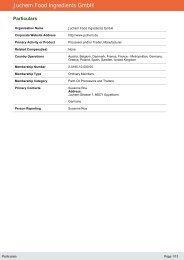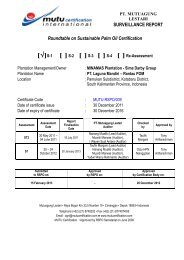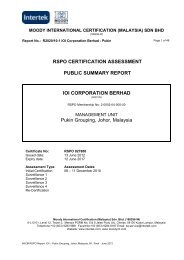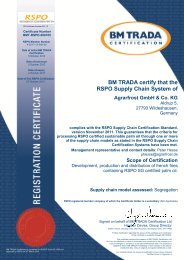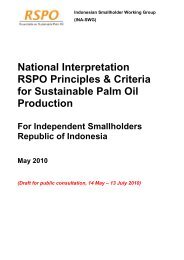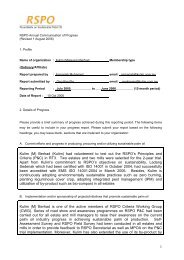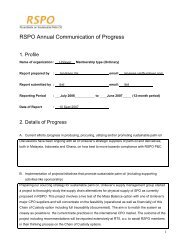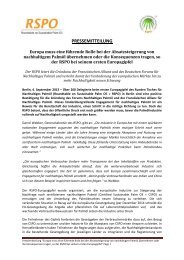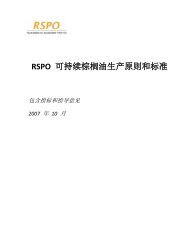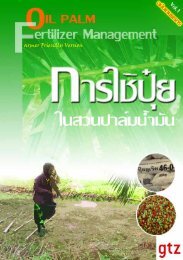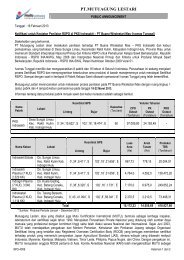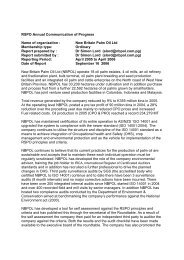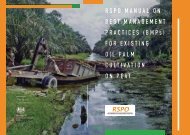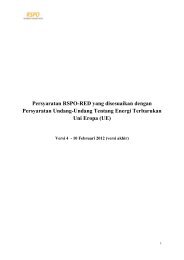RSPO CERTIFICATION ASSESSMENT PUBLIC SUMMARY REPORT
RSPO CERTIFICATION ASSESSMENT PUBLIC SUMMARY REPORT
RSPO CERTIFICATION ASSESSMENT PUBLIC SUMMARY REPORT
Create successful ePaper yourself
Turn your PDF publications into a flip-book with our unique Google optimized e-Paper software.
Criterion 5.5<br />
Use of fire for waste disposal and for preparing land for replanting is avoided except in<br />
specific situations, as identified in the ASEAN guidelines or other regional best practices<br />
The use of fire for any waste disposal is strictly prohibited such as in land preparation for new<br />
development and replanting. PTTN has a well implemented zero burning policy both in mill and<br />
estates. The wastes that are generated by mill and plantation activities are properly disposed off<br />
without burning. A notable achievement has been the total avoidance of use of fire for the disposal of<br />
garden wastes and packaging materials at the housing sites.<br />
Compliance Status : Full.<br />
Criterion 5.6<br />
Plans to reduce pollution and emissions, including greenhouse gases, are developed,<br />
implemented and monitored<br />
PTTN has identified pollution and emission sources, which comes mainly from boilers, generator sets<br />
and motor vehicles (5.6.1). Monitoring of their exhaust emissions is done regularly by independent<br />
laboratory - the smoke opacity results are recorded as part of its RKL-RPL (Environment Management<br />
and Monitoring) Semester Report. The parameters tested for are SO 2 , NO 2 , H 2 S and particulates as<br />
per the Ministry of Environment, Republic of Indonesia, regulation Peraturan Menteri Lingkungan<br />
Hidup No. 07 Tahun 2007. A check on the reports found that the levels complied with the standards<br />
(5.6.2). PTTN has a pollution and emission reduction program in which is prohibited the burning of<br />
EFB and domestic wastes in the mill, estates and housing complex; The domestic wastes were<br />
collected by contractor.. (5.6.3). There is SOP to treat POME and the records of monitoring POME<br />
are kept properly and were sighted.<br />
Compliance Status : Full.<br />
Criterion 6.1<br />
Aspects of estate and mill management including replanting that have social impacts are<br />
identified in a participatory way, and plans to mitigate the negative impacts and promote the<br />
positive ones are made, implemented and monitored to demonstrate continuous improvement<br />
PTTN has a method to monitor social information from the locals and its employees through SOP on<br />
Communication SOP/PBNE/Kom Rev.00 issued 1 July, 2010. and also conducted . Stakeholders<br />
meeting regularly every year . Some of social issue from local communitiies that has been<br />
responded by PTTN : provide job vacancies and job opportunities for local communities by<br />
conducting open and transparent employee recruitment process. Monitoring report : data of local<br />
communities employees was well maintained. The information is assessed and the results reported<br />
to the Environment Manager and concerned parties, such as the environmental impact-controlling<br />
agency, as a part of RKL/ RPL. The RKL/ RPL report covered the classifying the activities into<br />
negative and positive impact. The positives impact such as labour vacancy, cover crop planting,<br />
planting of main crops, maintenance of immature and mature crops. The negative impact arised from<br />
land clearing issues, and potential land conflict. A social impact also assessed the impact of<br />
company activities on the local communities. Interviews with the stakeholders indicated that the<br />
practice has resulted in improved relationships with the local communities.<br />
Compliance Status : Full.<br />
Criterion 6.2<br />
There are open and transparent methods for communication and consultation between<br />
growers and/or millers, local communities and other affected or interested parties<br />
PTTN has an effective communication and consultation procedure with smallholders and its local<br />
communities. It has also drawn up an external communication procedure. Consultation with<br />
stakeholders is done at least yearly, and minutes of the meeting on 10.06.2011 at Langga Payung Mill<br />
Office were sighted. The feedback from stakeholder consultation meeting that approved by<br />
management will become CSR and Community Development program Adjacent estate officers are<br />
responsible for communication with the respective parties on estate activities, while the Environment<br />
and CSR Department assumes overall responsibility for communication and consultation with<br />
stakeholders and to ensure that community programs are run effectively. A list of PTTN stakeholders<br />
includes the local communities, NGOs, labour union, contractors and local government.<br />
Compliance Status : Full.<br />
Public Summary Report PT.Tapian Nadenggan –Langga Payung Mill Page 30



